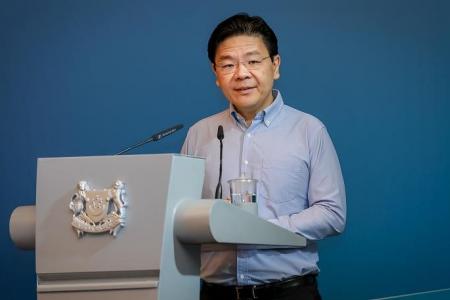9 in 10 Singaporeans dealt with for terrorism-related activities successfully reintegrated into society
Almost 90 per cent of about 140 Singaporeans who were dealt with for terrorism-related activities have been successfully reintegrated into society, including 53 of 58 former members of Jemaah Islamiah (JI).
But this did not happen easily. The Government faced a difficult decision after arresting the members of the JI group in 2003, Deputy Prime Minister Lawrence Wong said on Wednesday.
“What would we do with these individuals?”
The idea of rehabilitating and reintegrating terrorists was unheard of back then, and no other country was doing it systematically.
“But we knew that these terrorists had been radicalised by a distorted understanding of Islam, which is a religion of peace, not violence.”
The authorities also knew that these individuals were not just JI members or radicals, he added.
“They were also individuals with families; they had parents and spouses who loved and cared for them, and children who relied on them.”
The Government decided to forge its own way to give these individuals a chance at reintegrating into and returning to society, and approached two leaders of the Muslim community, Ustaz Ali Haji Mohamad and Ustaz Mohamad Hasbi Hassan, to help counsel the detainees and share with them Islam’s true teachings.
The two leaders pulled together a group of Islamic scholars and teachers and formed the Religious Rehabilitation Group (RRG), which marks its 20th anniversary in 2023.
Mr Wong, speaking at its annual retreat at Shangri-La Rasa Sentosa on Wednesday, said the group has been a key partner of the Government in countering the threat of terrorism and extremism, and its success is a testament to what Islam truly stands for.
Terrorism may not be top of mind for many Singaporeans today, but the threat of radicalism and extremism remains high, he added.
Mr Wong said that global terrorist groups such as the Islamic State in Iraq and Syria (ISIS) and Al-Qaeda continue to rebuild their strength and remain determined to sow disorder and chaos by conducting attacks in other countries, including Singapore.
The groups have become more sophisticated at using digital platforms including social media to spread propaganda and incite their followers to carry out attacks.
This has made extremist material easy to access, and accelerated the process of radicalisation to a matter of months or even weeks.
“Because all this now takes place behind a computer screen, it is much harder to detect,” Mr Wong said.
The terrorist groups have been increasingly targeting youth, who are more impressionable and susceptible to influence, he added.
Apart from using traditional social media channels, the groups have exploited online music streaming and gaming platforms popular with young people.
One self-radicalised 16-year-old in Singapore was issued with a restriction order in January, after he was exposed to ISIS ideology and extremist songs through YouTube and online music streaming platforms.
He also ventured onto ISIS-themed servers in an online game called Roblox, which recreated ISIS conflict zones in Syria and Marawi City in the Philippines.
There, he practised shooting ISIS enemies and even took a pledge of allegiance, or bai’ah, to an in-game “ISIS leader”, Mr Wong shared.
These platforms have given rise to a worrying trend – an increasing number of young people are dealt with by the Internal Security Department (ISD).
Since 2015, the department has issued Internal Security Act orders to 11 self-radicalised Singaporeans below the age of 21. Some of them started their process of radicalisation from as young as 14.
Before 2015, there was only one such case of youth radicalisation, compared with 11 cases in the last few years.
Mr Wong said: “It’s a very sharp increase and a worrying trend.”
The threat has also gone beyond Islamic extremism, he added.
“We have seen a broader range of radical, extremist and violent groups active in spreading their ideologies online.”
Among the 11 young people, one was a 16-year-old who had planned to conduct attacks against Muslims at two mosques in Singapore.
He was a Protestant Christian who imbibed far-right extremist ideology, including the manifesto of Brenton Tarrant, the 2019 Christchurch attacker in New Zealand. The ISD brought him in before any harm was done, Mr Wong said.
“Extreme and violent ideologies can radicalise any Singaporean regardless of age, race or religion,” he added.
This has serious implications for Singapore’s society as violent extremism will seek to exploit its racial and religious differences, and attempt to divide its people, he said.
Mr Wong said the work of the police and ISD will continue to be important in detecting and countering radicalised individuals, and the Government will strengthen its levers to protect people from radical and extremist ideologies.
But it would not be possible to completely insulate Singaporeans from everything online, so Singaporeans must be inoculated against extremist ideologies.
The public must be equipped with the right knowledge to identify and challenge extremist ideologies, and rehabilitation methods for detainees, including the growing number of young people, must evolve.
With more young people being targeted online, radical ideologies must be directly countered on social media too, he added.
RRG announced the launch of its TikTok account at the event, to reach a younger audience and correct misinterpretations and promote the right understanding of religious texts and concepts.
Mr Wong said: “Let us continue to stand united against any forces or ideologies that seek to tear apart our social fabric.”
Get The New Paper on your phone with the free TNP app. Download from the Apple App Store or Google Play Store now


